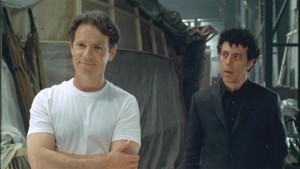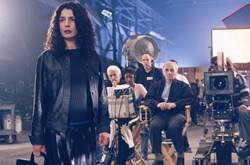|
What can be said about a film like Ararat? Despite its rather quiet arrival on the movie screens of the world, the answer appears to be "quite a great deal." As the film is an Armenian's take on the Armenian Genocide of 1915, an event which Turkey continues to deny to this day, it invariably breaks down into a squabbling match between Armenians and Turks over the validity of the claims made herein and the overall moral to be inferred, with Armenians shouting "Yay" and Turks crying foul. Being neither myself, I hold no particular bias, other than a healthy disapproval of the practice of genocide, and am more concerned with the efficacy of the film as a film than with whatever feelings it may stir amongst one or the other ethnic group. So what of the film as a piece of artistic acheivement?  The short answer is "potent, but somewhat shaky." Armenian-descended, Egyptian-born and Canadian-raised director Atom Egoyan admits he is incapable, or at least steadfastly unwilling, to make a normal, linear-order film, and Ararat is no exception. There is one hell of a lot of plot and a huge ensemble of characters, but at its most distilled, it's about a young man of Armenian descent working as a director's assistant on a film which is itself an historical drama on the genocide, and his efforts to understand and deal with the weight of his cultural history. Outside of this, there's about a million other things going on, all interrelated in a huge postmodern spiderweb of plot strands. There's the young protagonist's (Raffi's) mother, an art historian specializing in Armenian painter Arshile Gorky' works, his half-sister and girlfriend (Celia), who blames Raffi's mother (Ani) for her father's murder/suicide, the agenda-heavy Armenian director (Edward Saroyan) making the subtle-as-a-sledgehammer film-within-the-film (also titled "Ararat," just for clarity's sake) on the genocide, a customs officer (David) who interrogates Raffi after his return from a voyage of hoped-for discovery in his ancestral homeland, the officer's son (Philip), who works in the same museum Raffi's mom lectures at, and the son's gay lover (Ali), a man of Turkish descent who lands the role of major villain in Saroyan's film. Making a chart wouldn't hurt. The film skips about in time, between the events of the film's production, the return of Raffi from his voyage abroad, and the historical events of the genocide itself, which often segue straight into the scenes from fictitious director Saroyan's movie-in-progress version of those events. Close attention cannot be overemphasized as a needed approach to viewing here; the whole thing can get rather overwheleming. It's one of Egoyan's strengths that he tends to paint his films in narrow strokes instead of the broad, obvious ones used by most filmmakers. He focuses on tiny micro-vectors of human emotion and interaction that rarely get explored; the downside to this is that with so much non-exposited nuance, it's frequently hard to tell just what these people are on about. Motivations often get indescribably vague, and the fact that Ararat contains so many characters and plotlines means that some of them feel underdeveloped or unclear in intent. The character of Philip seems rather superfluous and serves only to provide an additional connection between his father and the other characters in the story, which isn't frankly necessary. It's also something of a stretch of believability that a customs officer would be terribly intrigued by an amateur history lesson imparted, however enthusiastically, by a random stranger. On the other hand, the character of director Edward Saroyan is utterly believable, a first-generation descendant of a genocide survivor whose film is about as even-handed as Speilberg's Saving Private Ryan: a totally black-and-white indictment of the Turks of the day that makes no bones about any ambiguity of evil. His viewpoint is in contrast to the young Raffi, whose attempts to bring some understanding of the past with the Turkish-descended Ali are honest and heartfelt, but only leave both men feeling isolated and upset. 
If there's one consistent idea or theme to be divined here, it's the destructive nature of denial, from the large-scale denial of the genocide to the small-scale denials in the lives of most of the principals. The links are there, but they're often tenuous; the conflict between Raffi and David is really verging on unrelated to the issue of the Armenian Genocide in any way, though it's the storyline that gives the film its climax. Perhaps the vagary is a deliberate commentary on the vagary of history, and particularly history that remains largely unknown and undocumented. Egoyan acknowledges the storytelling process as a slippery weasel with Saroyan's placing of the eponymous mountain within sight of the Armenian-dominated city of Van, which in point of fact it isn't, as a bit of "poetic license." History is, after all, merely "his story" when all's said and done, and the emergent story is a powerful force that can often wield more influence than the events themselves. Ararat at its core is about trying to wrench the truth from a morass of individual storytelling, and if it's unquestionably biased, I don't think it's biased against modern-day Turks, merely against modern-day perpetuation of denial. Ultimately, Ararat tries to be a wee bit too ambitious and suffers somewhat from it; there's a lamentable lack of clarity of total purpose for a film with a specific perspective to relate. But there's a lot of success to be found here, as well, and if you're looking for a film that will spur on a lot of after-viewing discussion, you could do much worse. Anything by Renny Harlin, for example. -review by Matt Murray
|
|
||||||||